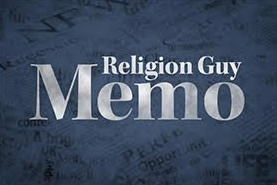Much of organized Judaism in the U.S. is “crumbling” and destined to suffer even worse decline in coming years, contends Rabbi Danny Schiff in his new book “Judaism in a Digital Age: An Ancient Tradition Confronts a Transformative Era” (Palgrave Macmillan).
Christian strategists face much the same cultural upheaval and should pay attention to this examination, alongside Jews and religion-beat journalists. Echoes of the “Mainline” Protestant plight are especially noteworthy. And consider the stakes for Judaism when the United States has 70% of the world Jewish population.
Schiff, a scholar with the Jewish Federation of Greater Pittsburgh, focuses on the two branches that dominated U.S. Judaism over the past century. Reform Judaism is devoutly liberal, with broad individual choice on belief and practice. Conservative Judaism is more tradition-minded — but has lately floated in Reform’s direction. The book pays less notice to the faith’s growing third main branch, Orthodoxy, because it is relatively stable as it resists modern pressures.
Here’s the situation in a numerical nutshell: As of 1990, 73% of U.S. Jews identified with these two main non-Orthodox branches. By Pew Research Center’s major Jewish survey in 2020, their combined following was down to 54%, while 32% of Jews reported “no particular identity” in terms of religion. (The Orthodox were a 9% minority that will grow due to higher birth rates.)
For Schiff, the years around 1990 were the end of an era when “partial emancipation” from past social barriers and prejudice turned to “hyper-emancipation.” Antisemitism, though still existing, was extinct in polite society.
A related sign was the prevalence of intermarriage with non-Jews, once relatively rare. By the 2010-2020 decade, 72% of marriages by the non-Orthodox were with non-Jews. Inexorably, that lowered the odds that children would follow in Judaism as adults. Added problems were widespread divorce, less marriage and lower birth rates. Finally, “barriers to leaving Jewish life are virtually non-existent.”
All the above will be familiar to religion specialists.
What’s innovative is the important midsection of the book, which is too complex to neatly summarize in this Memo. It’s an extended assessnebt of how religion must cope with all-powerful social media that erode all authorities, dissolve communities, and change “the way we think.”
The rabbi sees this as humanity’s fourth massive cultural disruption. The prior three (journalists take note) were the advent of writing 20,000 or more years ago; the invention of the alphabet in biblical regions around 4,000 years ago, which brought widespread literacy and education, and eventually democracy; and then mass communication via printing with moveable type, starting in 15th Century Europe.
The current “challenge is one of ideas,” not rejiggering Jewish programs and institutions, Schiff asserts. In his view, even the better numbers in the 1950-1990 heyday occurred “more by default than by devotion,” without “widespread enthusiasm for the ideological core” of Reform or Conservative Judaism, By 2020, Pew found that only 21% of U.S. Jews saw religion as “very important.”
Schiff’s iffy scenario for the future sees a “countercultural” Judaism that insists on face-to-face communities, with reformulated local synagogues as the essential center.
Some sense of halakhah (Jewish law or principles) must remain but, in his thinking, a very modernized and flexible version. Judaism will have an important role in defending “what it means to be human” over against problematic societal and scientific developments.
Then there’s this. Schiff asks, “If God is dethroned, can a coherent Judaism survive?”
Good question. To The Guy, the most eye-popping number in the 2020 Pew survey were that only 26% of Jews “believe in the God of the Bible” any longer, which compared with 56% of U.S. adults as a whole.



